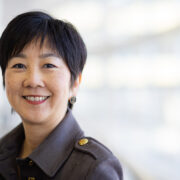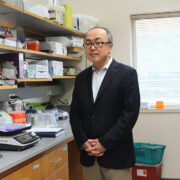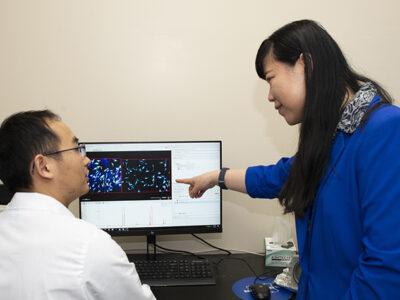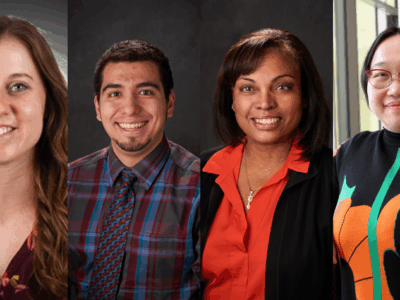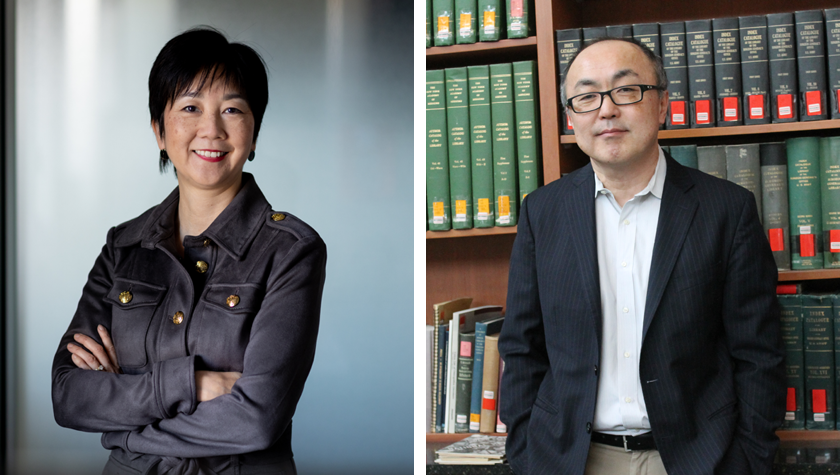
6
June

Professors Michelle Chui and Glen Kwon receive one of UW–Madison’s top faculty honors
By Nicole Etter
Professor Michelle Chui and Professor Glen Kwon have racked up a long list of impressive achievements as leaders in their fields during their careers at the University of Wisconsin–Madison School of Pharmacy. Now the latest accolade for their research, teaching, and service: the Vilas Distinguished Achievement Professorship.
“It’s a huge honor,” says Chui, Hammel-Sanders Distinguished Chair in Pharmacy Administration and director of the Sonderegger Research Center for Improved Medication Outcomes. “I view the Vilas Professorship as the pinnacle of awards at UW.”
“It’s a privilege to be recognized among the top faculty at UW–Madison,” says Kwon, Jens T. Carstensen Distinguished Chair in Pharmaceutical Sciences.
The UW presents a series of Vilas awards, named for William F. Vilas (1840-1908), a former UW–Madison law professor and UW regent who also served as a U.S. senator and the U.S. Secretary of the Interior. Some Vilas awards honor early- and mid-career researchers, while the Vilas Distinguished Achievement Professorship acknowledges exceptional faculty at the apex of their careers. The award provides recipients with five years of flexible funding to advance their work.
“To see two faculty in the same year being selected for this tremendous honor speaks volumes about the quality of research happening here at the School of Pharmacy.”
—Steve Swanson
Chui and Kwon join two other School of Pharmacy faculty who hold the Vilas Professorship: Professor Lingjun Li, and Professor Jeff Johnson, both of the School’s Pharmaceutical Sciences Division. Associate Professor Warren Rose and Professor Weiping Tang have previously received the Vilas Mid-Career Investigator Award, and Assistant Professor Cody Wenthur and Assistant Professor Jiaoyang Jiang have previously received the Vilas Early Career Investigator Award.
“Our faculty are some of the very best,” says School of Pharmacy Dean Steve Swanson. “Particularly for the size of our school, to see two faculty in the same year being selected for this tremendous honor speaks volumes about the quality of research happening here at the School of Pharmacy.”
Michelle Chui: Improving medication safety
Chui, who is the first Vilas honoree from the School’s Social and Administrative Sciences Division, directs the Systems Approach to Medication Safety Lab (SAMS Lab). A pioneer in the field, Chui notes that patient safety wasn’t publicly talked about until about 25 years ago.
Early research in the field focused on hospital care, but Chui was determined to focus on preventing errors in the outpatient setting, where most care is provided.
“How do we make sure that people are taking medications safely and effectively, as scientists intended?” she asks. “When you get into the population, things get really messy. People have busy lives; they don’t always understand, have good education, or necessarily speak English. We have not cracked that nut to try to really elevate their level of health care. That’s where my group comes in.”
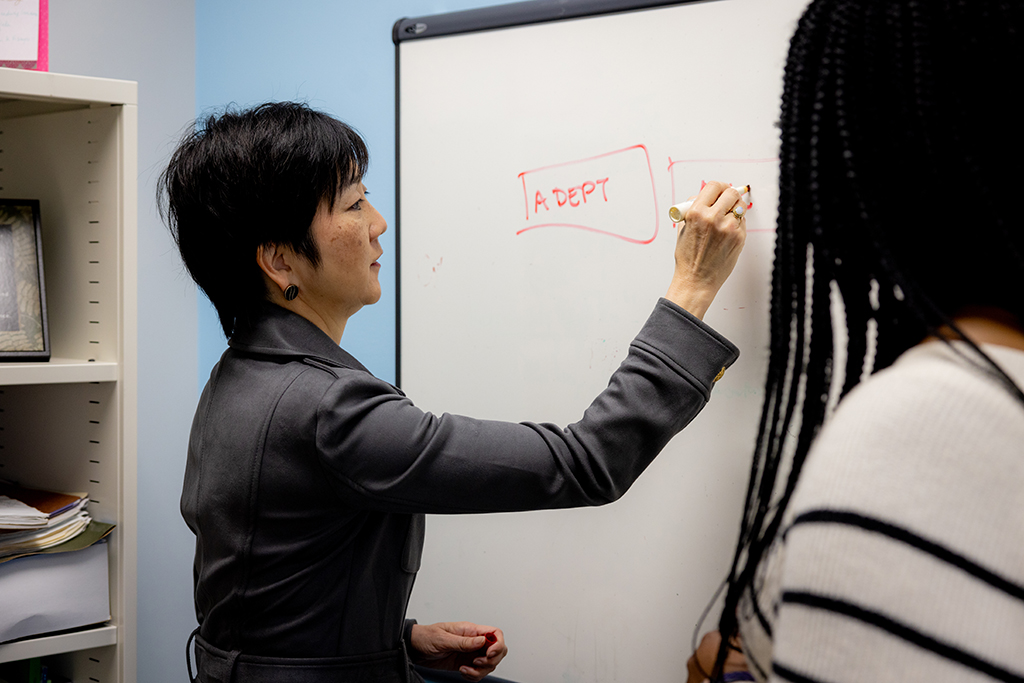
Chui helped reinvigorate PearlRx, the Wisconsin pharmacy practice-based research network that now includes more than 1,100 members. She partners with pharmacies in communities ranging from rural northern Wisconsin to the central city of Milwaukee and Racine.
“My life’s work is to try to keep older adults in their home as long as possible,” she explains. “That means my research focuses on how we can ensure that physicians have the knowledge to prescribe accurately. How can we ensure that pharmacists have the knowledge and are dispensing accurately and educating their patients and caregivers? And then how can we ensure that older adults know how to take their medication and understand side effects so they know when to call their doctor or pharmacy so we can keep them healthy, out of the hospital, and living their lives?”
A productive researcher, Chui has landed several federal grants and published more than 100 peer-reviewed manuscripts and book chapters.
“She is one of the top five pharmacy researchers in the country and is the only one who has been consecutively federally funded to improve medication safety,” says School of Pharmacy Dean Steve Swanson. “Not only is Dr. Chui a stellar researcher, but she imparts her wisdom and leadership to support the research endeavors of her colleagues and mentees.”
Chui is co-director of the Collaborative Center for Health Equity at the UW Institute for Clinical and Translational Research, and she hopes to continue to connect her passions around health equity and patient safety. She recently won a four-year grant from the Agency for Healthcare Research and Quality for a study aiming to improve medication safety through resilience engineering, and she plans to use her flexible Vilas funding to expand the project, designed with complex patients with multiple chronic diseases in mind, to look at how pharmacies can better care for Latinx patients as well transgender/nonbinary patients.
“We want to make sure we’re addressing the problems that are faced by real people,” she says.
Glen Kwon: Advancing drug delivery
For more than 20 years, the Kwon Research Group has focused on using nanotechnology to improve treatment outcomes for cancer and other diseases. Along the way, Kwon has accrued impressive statistics: 144 peer-reviewed scientific publications, 133 scientific abstracts, more than 20,000 citations and 21 patents.
Kwon, a founding member of the School’s Wisconsin Center for Nanobiosystems (WisCNano), has been funded by the National Institutes of Health (NIH), U.S. Department of Defense, and others. He is best known for his research on injectable chemotherapy for cancer, including a current NIH-funded study that uses polymeric nanotechnology to deliver combination therapies to target hard-to-treat breast tumors. The novel drug delivery method — which use nontoxic self-assembling block copolymers — allows Kwon’s team to more effectively deliver anticancer drugs to tumor tissue while potentially minimizing toxic side effects.
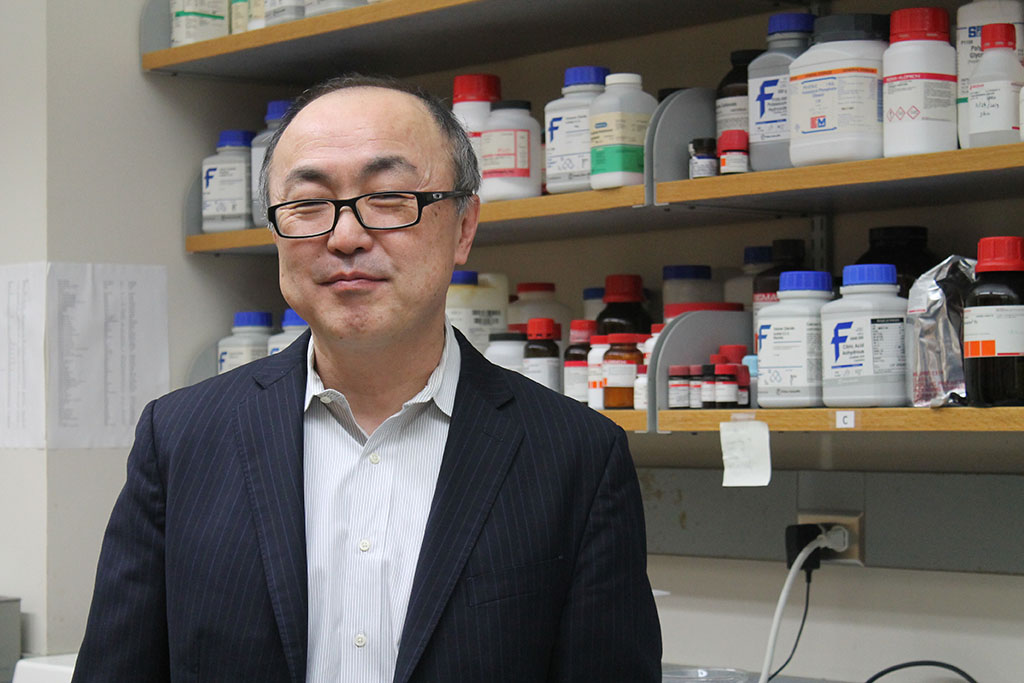
Kwon is co-founder and chief scientific officer for Co-D Therapeutics, a UW spin-off company that has developed under an orphan drug designation a first-in-class nanomedicine therapy for angiosarcoma, a rare cancer that affects the blood and lymph vessels.
Beyond cancer, Kwon and his collaborators have also developed a promising potential therapy for fibrosis, which could improve outcomes for a variety of inflammatory diseases.
“Dr. Kwon is an international leader in the field of drug delivery, and his research has broad-reaching implications across medicine,” says Swanson. “He also makes outstanding contributions in teaching and service.”
Kwon is an American Association of Pharmaceutical Scientists (AAPS) Fellow and founding faculty member of the UW student chapter of AAPS. He is generous with sharing his expertise in drug delivery, mentoring 34 PharmD and undergraduate students, 27 PhD students, and 17 post-doctoral researchers.
The Vilas funding will help support research and development of a novel 2-prodrug nanomedicine containing paclitaxel — a chemotherapy drug — and another drug that targets the tumor microenvironment (TME).
“The goal is to develop a safe and effective nanomedicine for triple-negative breast and pancreatic cancers, targeting TME to improve the penetration of paclitaxel into tumors and achieve synergistic anti-cancer activity,” Kwon says.


